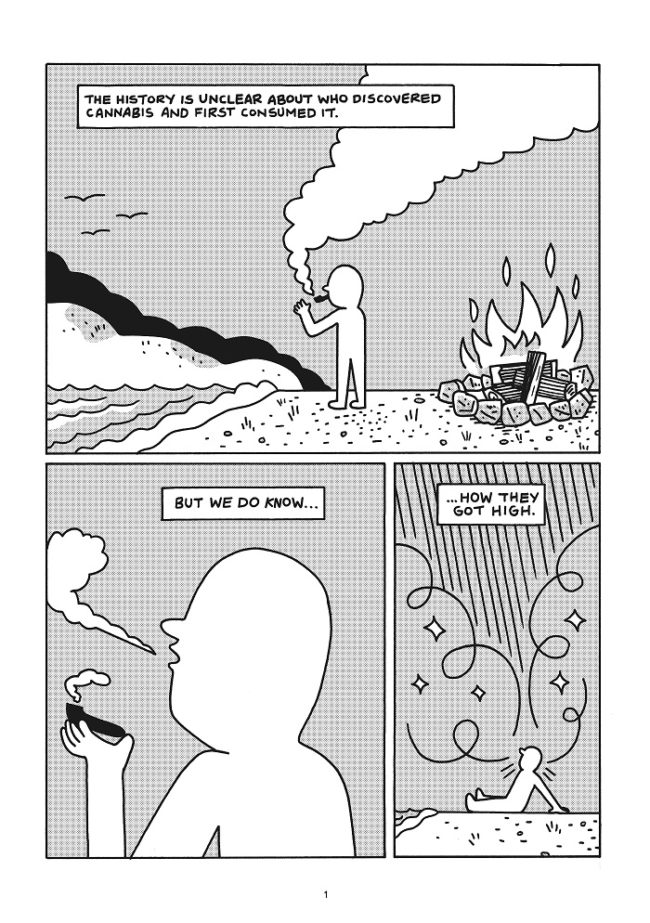I messed up my entire life because I got high
I lost my kids and wife because I got high
Now I'm sleeping on the sidewalk and I know why
'Cause I got high
Because I got high
Because I got high
-Afroman
It is a little difficult to resist the temptation to write something silly when the subject is marijuana. But as Box Brown more than ably demonstrates in his new book from First Second, Cannabis: The Illegalization of Weed in America, the consequences of its criminalization here and abroad are deadly serious.
Brown has several nonfiction graphic novels under his belt including a history of Tetris and biographies of Andre the Giant and Andy Kaufman. He has settled into a comfortable grove of drawing popular histories on a variety of different subjects. Brown’s visual style is deceptively simple: a consistent, unwavering line, depicting flat, boxy people and scant background details. Brown prefers bold, iconographic shapes with heavy, solid blacks and a Zip-A-Tone-esque gray.
For nonfiction, Brown is refreshingly on the more cartoony end of the spectrum. He’s not afraid to draw motion lines or lightning bolts of shock or pain. It’s not his first rodeo — he knows to mix up his compositions to keep it interesting for the reader.
For a history of marijuana in the United States, Brown begins farther back than I would have imagined. He goes just about as far as one could — to the apocryphal first human who smoked marijuana. From there he weaves forward in time, from mythological explanations for weed in India, to conquistadors in Mexico and then finally into the US. It’s satisfying to see a more 21st century perspective on figures like Hernán Cortés. “Cortés brought with him destruction, disease, death and Catholicism,” writes Brown.
 Indeed, Brown’s version is much more woke than the traditional telling. He shows, again and again, a repeating pattern of law enforcement and government using cannabis as an excuse to crack down on and restrict minorities. Brown deftly lays out marijuana’s historical contributions towards many contemporary societal ills, from mandatory minimums to the demonization of the “inner city.”
Indeed, Brown’s version is much more woke than the traditional telling. He shows, again and again, a repeating pattern of law enforcement and government using cannabis as an excuse to crack down on and restrict minorities. Brown deftly lays out marijuana’s historical contributions towards many contemporary societal ills, from mandatory minimums to the demonization of the “inner city.”
The narrative can be a little too reductive at times. There are sentences like, “when jazz was exported to Chicago, cannabis came too,” that lack explanation or context. But overall, the text avoids overly complicated and confusing descriptions and is a fun read. It’s not a textbook and instead serves as a great introduction. I can imagine that if I had a nephew living at home who didn’t really like reading and was a little too interested in pot and not much else (and I would bet we’ve all met somebody like this), they might really respond to this book. It’s an easy and fun read with a solid bibliography.
And thankfully, there are real funny moments too. Brown’s invented historical dialogue plays nicely against his informative narration, much like Ron Howard as the narrator in Arrested Development. “Most murderers smoke marijuana,” says a doctor. “It’s true!” he says. “It’s not,” says the narration.
The book is a welcome addition to the contemporary conversation about marijuana’s role in society. My one real complaint is where the book ends. After bringing the history up to California’s legalisation of medical marijuana in 1996, Brown quickly winds down with a five page closing argument that shies away from addressing contemporary laws and policies.
 “Cannabis is a safe and effective drug that many people enjoy the benefits of,” writes Brown. “There is no reason it should have been prohibited in the first place.” OK, great. But now what? If you pick up the book expecting it to engage with hot topics, including edibles dosage, pot market regulation, epilepsy treatment or the need for more research, you won’t find them anywhere.
“Cannabis is a safe and effective drug that many people enjoy the benefits of,” writes Brown. “There is no reason it should have been prohibited in the first place.” OK, great. But now what? If you pick up the book expecting it to engage with hot topics, including edibles dosage, pot market regulation, epilepsy treatment or the need for more research, you won’t find them anywhere.
At an event here in Washington, D.C., I asked Brown about this and he said that books are written far in advance and he didn’t want to date the content immediately upon release. I’m sympathetic to that, but I think the book does the reader a disservice by leaving the politics back thirty years ago. There’s still a way to talk about the myriad issues related to marijuana that governments, companies and consumers will undoubtedly be contending with for decades.
I get it, it’s complicated. You’re telling me! Here in D.C., thanks to half-assed congressional interference, smoking pot is legal but buying it isn’t. In our weird barter economy, one can order a box of normal, chocolate chip cookies on the internet and upon delivery, be offered a “free gift” of an eighth of marijuana. This isn’t how anyone intended it and it’s not ideal. Municipalities will continue to adjust and try new policies. Some will work great and others surely won’t. But we need smart writers and artists who know the issue, like Brown, to reckon with the details on our behalf. I think it’s worth the risk of being dated.







